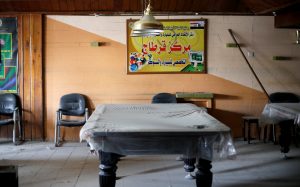
By Michael Georgy
MOSUL (Reuters) – As raw sewage gushed out of a crater made by an airstrike against Islamic State in Mosul, seething residents who sold their clothes to survive had a sobering message for Iraqi politicians boasting of military advances against the group.
“If life does not improve, we will not accept this and there will be a revolt against the government,” said Ihsan Abdullah. “If things don’t change Islamic State will just come back. Mosul residents will support whoever can help them.”
A former traffic policeman, he said he had not worked since Islamic State swept into the city in 2014, leaving him no choice but to sell his clothes for food.
When government forces arrived, he asked for his job back, but he was told he would first need to go to Baghdad to get clearance proving he was not a member of Islamic State. That would take too long, he said.
Iraqi forces have driven the militants out of east Mosul, and are poised to expand their major offensive into the western half of the biggest city in northern Iraq. That has brought relief after more that two years of Islamic State’s harsh rule.
But residents are turning their fury towards the Iraqi government, blaming it not only for current hardships such as a lack of basic services, but for the conditions that enabled Islamic State to take over Mosul in the first place.
Many bitterly recalled the ease with which about 800 Islamic State militants seized control in a few hours, as thousands of Iraqi soldiers fled.
“All of this is because of the politicians. They sold out Mosul and created sectarian problems. It was in their interest to divide the country,” said coffee shop owner Akram Waadallah.
A group of men around him supported that view, standing beside shops destroyed by Islamic State’s rule and the firepower needed to dislodge the jihadists.
One man stepped forward and echoed a common complaint. “There is no running water. What are we supposed to do drink out of a dirty well?”
WINNING BACK TRUST
Iraqi leaders say they are determined to eradicate Islamic State, stabilize the country and create jobs for citizens.
Mosul, once a thriving trade hub and center for higher learning, is especially sensitive to sectarian tensions.
Sunnis, the majority in the city but a minority in Iraq, were all-powerful under Saddam Hussein. Many Sunni army officers hailed from Mosul, and many in the city were resentful after Saddam was toppled in a U.S.-led invasion in 2003 and Shi’ites came to dominate the government in Baghdad.
When the Sunni Muslim fighters of Islamic State swept into Mosul in 2014, they were welcomed by many fellow Sunnis who had accused the Shi’ite-dominated security forces of abuse.
Islamic State’s brutal rule and intolerance eventually alienated the public, but driving the fighters out is only the first step for the authorities trying to win back trust.
The battle for Mosul could make or break Iraq. If sectarian tensions persist, Iraqi officials say, the country will fail to unite and could even be partitioned based on sect.
For now, Mosul residents are focusing on their immediate needs, finding jobs and persuading authorities to provide basic services like water and electricity.
Former Iraqi soldier Azhar Mohamed was relieved when Islamic State was driven out of Mosul. When they were running Mosul, he often moved from house to house, rarely spending more than a night in one place to avoid capture.
But hardships persist. He too can’t seem to persuade authorities to give him his job back, so he can start to rebuild in a city with rows and rows of demolished buildings, shuttered shops and deep suspicions of the Baghdad government.
“I just want my job,” said Mohamed.
(Editing by Peter Graff)









